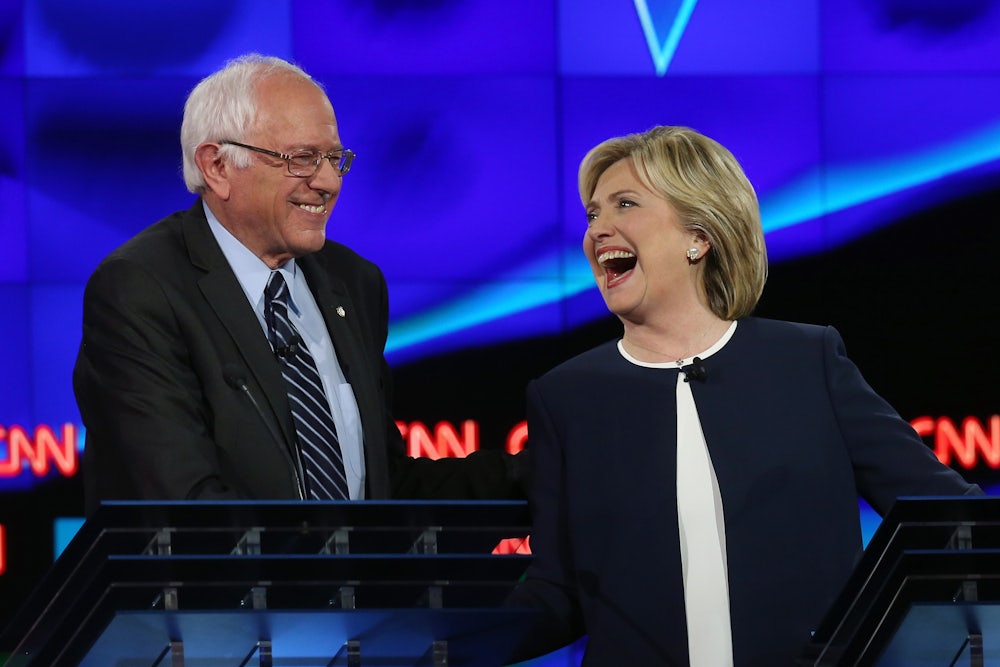One of the most memorable moments of the Democratic primaries came during the first Democratic debate in October, when Bernie Sanders proclaimed his intent not to go after Hillary Clinton for using her personal email account for government business while she was secretary of state. “Let me say something that may not be great politics,” Sanders proclaimed. “The American people are sick and tired about hearing about your damn emails.” The audience roared, and Clinton could not have looked happier as she shook his hand and thanked him.
Sanders’s decision to defend his opponent when he could have gone in for the kill was, in fact, great politics. Facing a Democratic crowd that liked both him and Clinton, Sanders appeared high-minded and magnanimous, willing to defend a fellow Democrat rather than score cheap points. This was a pivotal moment in the campaign, since it was the first time millions of Democrats saw Sanders, and he came across as a mensch.
But what was a shrewd maneuver on Sanders’s part might have served him better than it did the party. A harsh State Department report released Wednesday condemned Clinton for her handling of the emails and stated unequivocally that this was done without the agency’s permission. So the very questions Sanders brushed aside last fall will now become fodder for Donald Trump against Clinton in the general election.
Part of the function of primaries is to vet and test candidates, to put them through the rigor of a preliminary run where all sorts of questions about their background, policies, and campaigning skills can be tested. Democrats have worried that this particular primary has been too harsh, with Sanders potentially damaging Clinton before the general election by suggesting that she’s corrupted by her reliance on Wall Street funding. These worries are misplaced: If anything, the primaries have been far too gentle, with both Clinton and Sanders refraining from truly devastating attacks.
This is a marked contrast from the 2008 Democratic race, when the two candidates went all-out at each other. At times they seemed to go too far, with the Obama camp portraying Clinton as untrustworthy (an accusation that haunts her to this day) and the Clinton camp using racially charged tropes to suggest Obama was foreign. These attacks had an undeniable downside. When a Clinton surrogate referred to a photo of Obama in Somali garb as showing the candidate in his “native clothing, in the clothing of his country,” it gave birtherism a bipartisan patina. But still, Obama’s skills at deflecting these attacks led to the finest moments of the campaign, like his historic speech on race in the wake of revelations about his ties to the firebrand preacher Jeremiah Wright. As unpleasant and even dishonorable as the Clinton attacks were, they allowed Obama to prove his mettle. Moreover, many of the issues the Republicans might have wanted to use in the fall were already old news because the Clinton camp had raised them.
There has been far less testing this time around. Sanders’s attacks have all been connected to his larger critique of the Democratic Party and the role of big money. They don’t touch Clinton personally, but indict a system. Conversely, Clinton hasn’t ever felt that Sanders is such a threat that she needs to pose harsh questions about his radical past, matters that would certainly be brought up if Sanders were the nominee. Both Sanders and Clinton have sparred knowing that they’ll eventually need to mend fences and unite. This has spared the Democrats a nasty and demoralizing primary season, but it means Clinton won’t be prepared for many of the attacks to come.
The fact is, the “damn emails” haven’t gone away. Trump has promised to use the email scandal “bigly” against Clinton. By taking the high road early on this issue, Sanders may have spared Clinton in the short term, but he robbed her in the long run.
